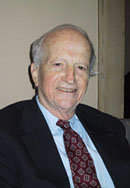Gary Becker, 1930-2014

Gary Becker (Photo: University of Chicago Press Office)
I’m so sorry to have to write that Gary Becker passed away on Saturday, at the age of 83. Gary was not only the most creative and influential economist of the last 50 years, but also a kind and gentle person, a mentor, and a close friend.
Others will write at length about Gary’s contributions to economics. I want to say just a few things in that regard. About ten years ago, Pierre-Andre Chiappori and I analyzed which economic theorists have had the greatest impact on empirical research by looking at the key motivating citations in papers published in top journals in recent years. Becker was by far the most influential theorist by our metric. What was most remarkable was that thirteen different works of his were cited; no one else had more than three or four. He published influential research in every decade from the 1950s to the present – incredible longevity. No one else had longevity like that.
The amazing thing about Becker’s research is that it wasn’t technically very sophisticated at all, and often the conclusions he came to were both obvious and intuitive, once he led you there. Of all the economists I’ve ever known, he was the one who was most able to see through the clutter to the basic truths.
I remember once sitting at lunch with Becker. The conversation had turned to the topic of addiction and the relative power of various substances to addict the user. The general consensus was that crack cocaine was the most addictive substance on the planet. Then Becker said “Actually, people are the most addictive thing on the planet.”
This idea had never occurred to me, but then I thought about how people act when falling in and out of love, and I knew immediately that Becker was right, and that he was simply pointing out the obvious. There are so many things he said, almost offhandedly, that stick in my head as important things I know about the world.
Gary had a reputation for being extremely tough. He absolutely terrified people. But not once in twenty years did I hear him raise his voice, or even appear openly angry. People feared him because he could see the truth. At his core, though, he had a deep humanity.
Years ago, my son Andrew died unexpectedly in the middle of the school term. I cancelled my classes for a few weeks. Only when I returned did I discover that Gary had stepped in, without anyone asking him to, and had taught the classes in my absence. The only problem was that my students were so disappointed when I returned!
For decades, Gary ate lunch every Monday at the University of Chicago faculty club (known as the Quad Club). The speaker in Gary’s workshop (the world-famous “Applications Workshop”) would join whatever faculty who showed up that day to eat with Gary. Like most of the faculty in the economics department, I was a member of the Quad Club. When I did the calculations, though, I figured out I was paying $70 per lunch, if I included both the cost of food and the membership fee. So I led a coup, and I convinced all the young faculty not to renew their membership, figuring Gary would relent and hold the lunch elsewhere. I failed, partially. I never got Gary to move the lunches away from the Quad Club, but he did buy me lunch almost every Monday for the last five years because guests have no way of paying for their own lunch!
At various points in my career, I have been the target of intense criticism, often carried out in very prominent and public forums. During one of these periods, Gary summoned me to his office and asked me how I was doing. I told him I was doing fine, but the criticism was exhausting. He got a conspiratorial look on his face and he leaned in close to me and made a confession: “I never minded when people attacked me; I actually kind of liked it. You know what drove me crazy? When people ignored me. So as long as people are willing to spend the energy to attack you, you know you are doing something right.”
One thing Gary hasn’t had to worry about for a long time is being ignored. And there is no doubt in my mind that will be continue to be true far, far into the future.
But Gary, we miss you already.

Comments